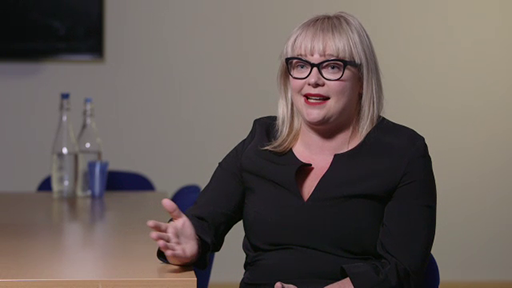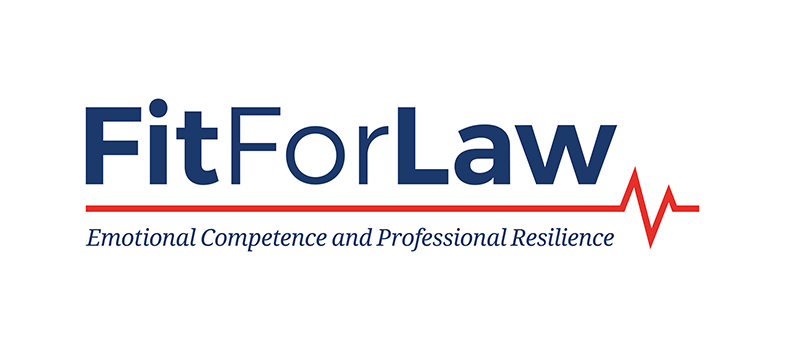Managing and understanding yourself
1. Introduction
This section includes:
- Introductory text
- An information box on “What is an emotion?”
- 1 video.
You should allow yourself 20 minutes to complete this section.
This part of Fit for Law gives you the opportunity to think about how you exercise your judgement, know your limitations, take on responsibility, deal with stress and reflect on your work. Its fundamental premise is that acknowledging and regulating emotion and factoring emotion into your work will enhance your legal practice and your wellbeing, both of which are important to ensure a healthy legal profession. This video shows a variety of legal professionals giving their views on why these issues are important.
Why you need to be Fit for Law

Transcript
You may find some of the sections cover areas of emotional competence you already have strengths in, others might cover areas you find more challenging. When you see a section you are good at, it is worth noting this down as a key strength. When you find a section you feel you need to work on, you should note this as a developing area and try to identify some short-term goals to help you improve on this. In other words, create your own personal development plan.
You could do this using a notepad and pen, or a word document, or even a notes function on your phone or tablet. The important thing is to ensure it is kept somewhere safe and secure where you can read it back at a later date. For example, if you are struggling with confidence, you can look over your key strengths to get a better perspective on your abilities. When you are feeling able to improve, you can work towards improving your developing areas to upskill yourself (perhaps using your Continuous Professional Development allowance).
What will I gain from this topic?
It is vital for legal professionals to demonstrate emotional competence. In other words, regulate their responses to emotion in an appropriate and psychologically healthy manner. Anyone in legal practice is constantly (knowingly or unknowingly) dealing with range of emotions as they interact with clients, colleagues and others, juggle a variety of tasks and demands and seek to balance the pressures (and pleasures) of work with family, leisure and other commitments. Understanding this and learning how to manage emotions in themselves and others will enhance their performance at work and also their professional resilience.
Legal professionals who use their emotional competence effectively will have the professional resilience needed to deal with a challenging and demanding working environment. Understanding the role of stress and reflecting on their approach to practice will assist them in developing emotionally and psychologically healthy ways of working.
In the long term, trying to ignore these elements of legal practice is unlikely to be an effective strategy. If a legal professional struggles to regulate their emotions effectively and does not develop appropriate levels of professional resilience, this can significantly impact both on the quality of their workplace performance and their personal wellbeing (as well as that of those around them). In the longer term, it can also contribute to psychological issues such as burnout, or vicarious (secondary) trauma (experiencing trauma symptoms after engagement with traumatised clients, or after encountering accounts of trauma).
"…So when I started doing nasty kind of child sex cases and stuff, and I have a friend who’s a police officer, a friend who works in social services, they had counselling, support, just viewing horrible images; whereas for barristers, criminal defence barristers you have no extra training."
"I have to be able to go from one office or one room 20 minutes ago talking about a completely acrimonious litigation matter to then be sensitive to deal with someone whose wife has just died two days ago. You know, you have to. And when you’re doing that for eight hours a day, it’s impossible to switch off. You’ve had the whole emotional circle going on in your head..."
What is an emotion?
This may seem like an obvious first question for a course involving emotional competence, but in fact there is a vast amount of scientific and philosophical debate about what emotions actually are, with many commentators tracing the debate's origins back to Plato and Aristotle in Ancient Greece. A simple starting point is to define an emotion as “…a particular, conscious event, high in intensity but short-lived and easily labelled and recalled” (Bornstein and Wiener, 2010: 1).
For example, the experience of relief when a deadline is met or disappointment when a claim goes badly. In Section 2, the role of emotion will be explored in more detail. In the box below, read through the definition of each emotion and the example of how that emotion might feel. Notice how these descriptions show the way the individual and their environment interact to give rise to a particular emotion. The emotion is influenced by the individual, the environment and the context.
This idea of the interaction between individuals and their environment giving rise to emotions reinforces how important it is not to simply change an individual’s response or emotion, as these do not occur in a vacuum. Instead, it is important to consider the environment and context, such as the legal workplace, that give rise to particular emotions.
Please click on the faces below to see examples and definitions of common emotions
It would be useful to pause here and spend a moment thinking about which of the emotions you have experienced during your work in the last two weeks stick in your mind. Firstly, think about what characteristics or circumstances of work gave rise to these emotions? Secondly, think about how you dealt with them and were these strategies successful?
I’m not stressed or feeling burned out, is this topic relevant to me?
Emotional competence and professional resilience are fundamental parts of legal practice for everyone. Even those who are able to regulate their emotional responses very well overall may find that there are some situations or issues that arise where they are uncertain or worried about how to respond. Even people who enjoy working under pressure can find stress beginning to impact on their work and wellbeing. Those who are naturally reflective may find that this is eroded as the pressure to rack-up chargeable hours becomes a key focus, similarly those who feel they thrive on pressure may reach a tipping point where they feel overwhelmed by deadlines, paperwork and the demands of cases...
"… and it took that almost crisis with me where I burned myself out where I thought something has to change significant in my life"
"…you know, lawyers, they’re not all tough cookies, you don’t have to be a tough cookie."
This topic will cover common situations and issues that arise within all areas of legal practice, identify some of the challenges and opportunities and provide you with useful, evidence-based tactics and suggestions for dealing with them. Its focus is on up-skilling people to work in emotionally and psychologically healthy ways which will benefit them personally but also those around them and the wider legal working environment.
